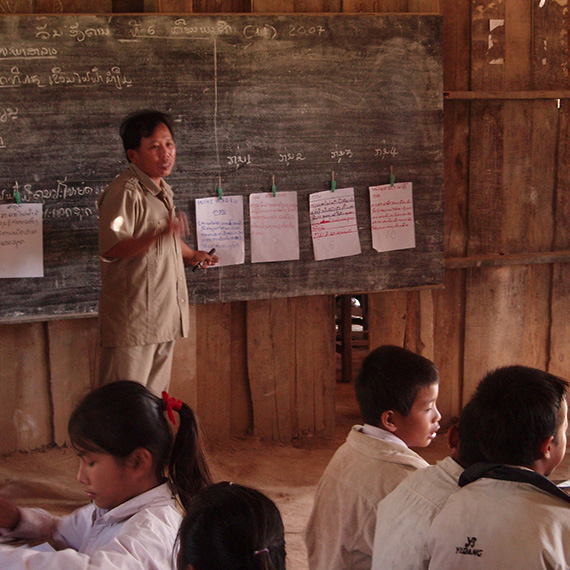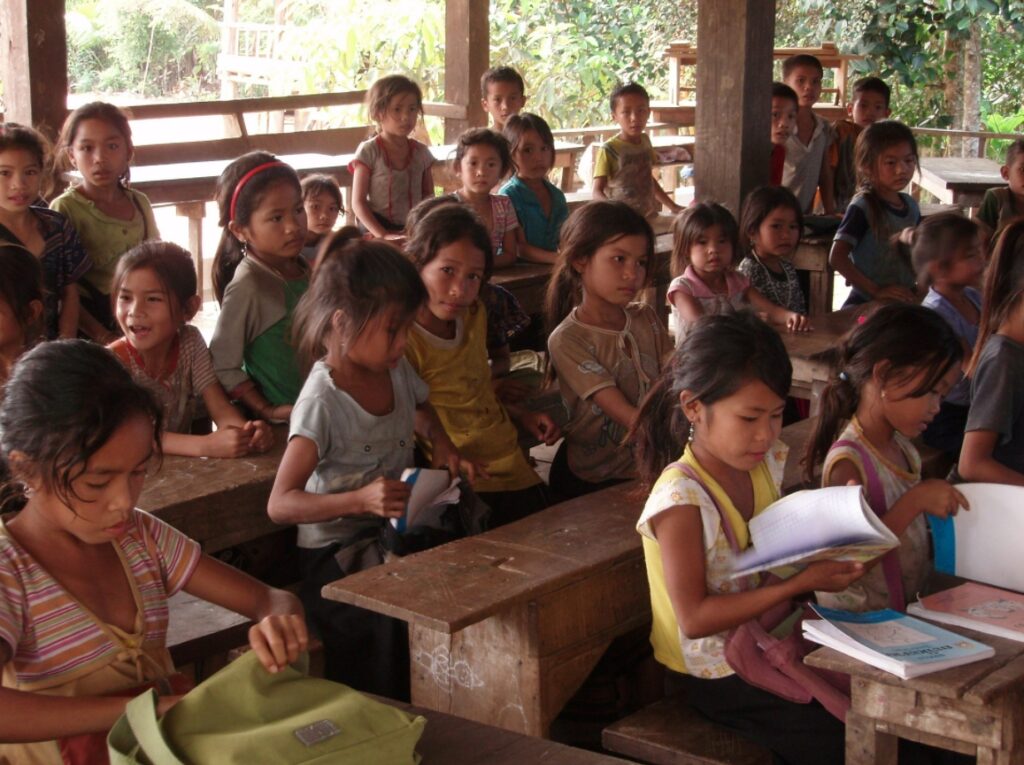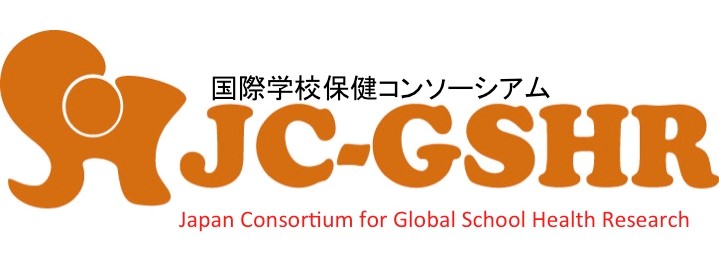Contents
What is FRESH?
To Embody the FRESH Principles
In cooperation with international institutions, global NGOs and other organizations, the Japanese Consortium for Global School Health Research, as a member of the FRESH Coordination Group, has proposed new strategies and other action plans for the development of school health activities around the world in an effort to embody the FRESH philosophy.
Started as a Framework for Comprehensive School Health

FRESH : Focusing Resources on Effective School Health
Proposed by the WHO in 1995, the Global School Health Initiative emphasizes that schools should function as centers for promoting health-related activities in the community and clearly stipulates that it is necessary to increase the number of schools maintaining such function (health-promoting schools) 1 & 2). This has extended the health-promoting school approach, in which schools are central to comprehensive health promotion in the home and community, from Europe to Asia. Subsequently, in 1999, UNICEF proposed Child Friendly Schools and advanced health-promoting activities based on the concept of protecting the rights of children 3).
However, the reality that these activities have many overlapping aspects and that each organization approaches the issue based on a different philosophy present issues in regard to effective use of resources. Accordingly, the WHO, UNESCO, UNICEF and World Bank discussed integrating their resources directed for school health (personnel, money, etc.) into activities that are expected to be effective. The result was FRESH (Focusing Resources on Effective School Health), a proposal for a comprehensive school health framework in 2000.
FRESH Guiding Principles Four FRESH Guiding Principles
FRESH is a reconfirmation of the effectiveness of health activities at schools as a measure for improving the state of children's health. Its aim has been to elevate learning outcomes by improving children's health and nutrition. FRESH also specified the need for linking national plans and school health activities in order to achieve Education for All (EFA), a global program providing
opportunities for all children to go to school.
Four FRESH Guiding Principles
Guiding Principle 1
Implementation of school-based health policies that include the provision of health services and health education focusing mainly on the acquisition of health and hygiene skills
Guiding Principle 2
Schools as a model for health and hygiene behavior through the provision of safe drinking water and sanitary facilities at schools
Guiding Principle 3
Provision of health education that is based on the acquisition of health and hygiene knowledge, attitudes, values and skills so that children engage in desirable behavior and decision-making concerning their health and hygiene
Guiding Principle 4
Provision of school-based health and nutritional services
Citations & References
1)WHO、 WHO's Global School Health Initiative: health-promoting schools http://www.who.int/school_youth_health/media/en/92.pdf?ua=1、 1998
1)WHO、 WHO's Global School Health Initiative: health-promoting schools http://www.who.int/school_youth_health/media/en/92.pdf?ua=1、 1998
2)WHO、 Promoting Health through Schools The World Health Organization’s Global School Health Initiative、http://apps.who.int/iris/bitstream/10665/41987/1/WHO_TRS_870.pdf 、 1997
3)Child Friendly School:www.unicef.org/lifeskills/index_7260.html
4)FRESH:www.freshschools.org/
5)MDGs:www.un.org/millenniumgoals/
About FRESH
Starting Point for FRESH: Promoting Improvement of Educational Quality and Fairness
“Education for All” means ensuring that all children have the right to receive high-quality basic education, that children are able to learn, and that there is a school environment which is able to accept such children, and that basic education programs are constructed. Also, schools must maintain an environment which warmly welcomes children, where children are able to make friends , which is healthy and beneficial for children, and which is capable of protecting children. When making schools more accessible and improving the quality of education, constructing a learning environment which children are familiar with are essential elements of activities implemented in countries around the world.
As stated in the “World Declaration on Education for All,” poor health and malnutrition are significant elements underlying issues such as low rates of school attendance, long-term absence, low scholastic standards and early drop-out rates. Consequently, it is essential for promoting basic education for all children that there be programs promoting student health and that good sanitation and nutrition be realized.
In addition, promoting student health and realizing good nutrition are also essential for high-quality basic education and, at the same time, an important outcome of basic education as well. First, unless children are in good health and well nourished, they are not able to participate in their education in a satisfactory condition and they are unable to obtain the maximum effects of learning. If improvements are made in children’s health and nutrition during early childhood education and elementary school, then school-aged children’s learning may be improved along with educational effectiveness. Second, high-quality education is linked to better health and nutrition for children. Thus, it can be expected, particularly in the case of girls, to be handed down also to the next generation of children. Furthermore, the creation of a school environment that is very healthy and safe protects children from health hazards, abuse and alienation.
The WHO, UNICEF, UNESCO and World Bank have, based on their experiences, assembled a foundation upon which they jointly strengthen the establishment of healthy schools for children, and have proposed contributing to the creation of child friendly schools by implementing activities which uses cost-effective methods to form the core of such a commitment. Presently these four international institutions are moving forward to construct a partnership for implementing FRESH (Focusing Resources on Effective School Health). The FRESH commitment was initiated at the World Education Forum held in Senegal in April 2000.

FRESH Background
Essential elements for realizing an effective education system are healthy children who are able to learn. This is particularly true when realizing education for all in regions where poverty is most advanced. By improving school enrollment rates and reducing long-term absence and dropouts, the most disadvantaged children, who are those living in the poorest levels of society many of whom are girls, are able to go to school. It is these children who have the poorest health and suffer from the worst malnutrition. Improving their health makes it possible for them to gain the most benefit from education.
Effective school health programs are constructed with the cooperation of communities, and health promotion is sustainably promoted in the most cost-effective manner among young people and the broader community.
Improving the health and learning of children attending school with school-centered health and nutrition improvement programs is by no means a new concept. There are school health programs in many countries, and many organizations have decades of such experience. Because of such common experiences have been accumulated, a proposal was made to broaden the scope of school health programs by having organizations collaborate in a cooperative relationship to further improve effectiveness. Effective school health programs contribute to child friendly schools, which also contribute to promoting education for all.
Relevant organizations have revealed that there are activities which form the core of such initiatives. These activities bring together best practices accumulated from program experiences and have been recommended by participating organizations. By first prioritizing such activities, participating organizations are better able to collaborate and offer consistent advice for school health programs and projects in each country. These efforts are characterized by a narrower activity focus and collaboration worked out among organizations. More and more countries are able to incorporate a response to school health that is aimed at creating child friendly schools and further expanding such programs. However, these programs are only a starting point, and may be flexibly adapted as appropriate.
Also, these activities contribute to organizations’ current efforts, and are essential for creating effective schools, including the “Health Promoting Schools” advanced by the WHO, global efforts furthered by UNICEF and UNESCO, and the creation of effective schools by the World Bank which are healthy, sanitary and safe. In other words, activities transcending institutional walls promote greater educational quality and fairness through “Focusing Resources on Effective School Health” and signifies a FRESH start.
